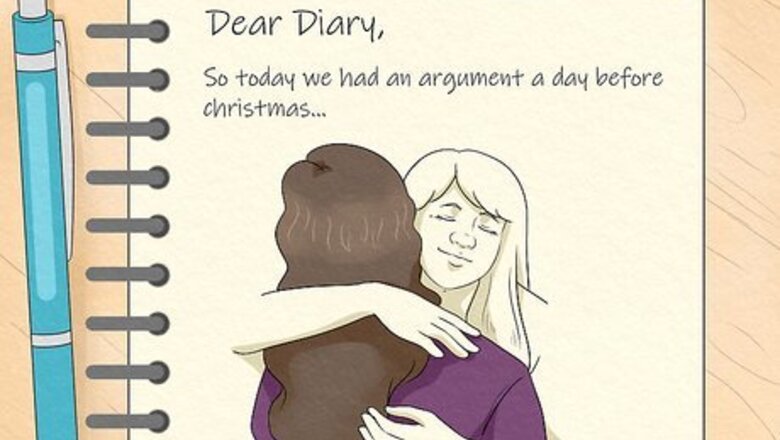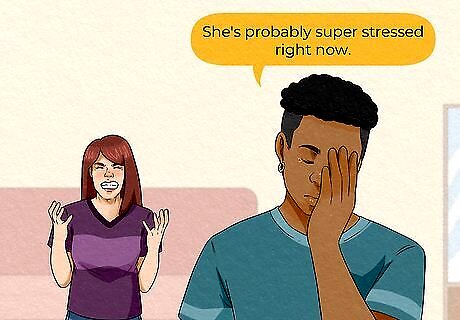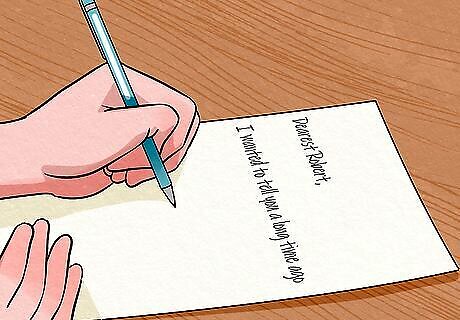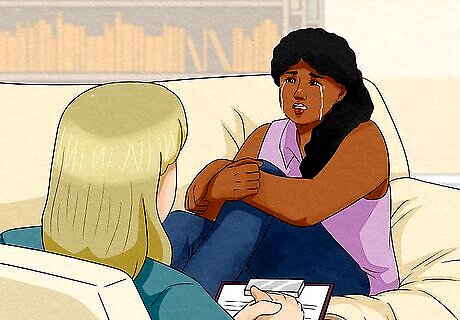
views
Keep a journal.

Create a safe space where you can vent about your feelings. When you’re in a bad marriage, it can often feel like you have no one to talk to. If you need to express your emotions and talk about what you’re going through, keep a journal and write in it every day. Chances are, it will strengthen you to take steps to move on from the relationship. Make sure this journal is completely private so that you can express yourself fully.
Reflect on all the ways you’ve tried to fix your marriage.

Chances are, you’ve already done a lot to work on your marriage. If this isn’t the first hurdle you’ve encountered with your spouse, you might have tried various methods to fix the issues in your relationship. Try to remember those, and think back on all the ways they didn’t work. This will help you remain solid in your decision that it’s time to move on. For instance, maybe you’ve tried couple’s counseling before and nothing has really changed. If that’s the case, it may be time to move on.
Regain your independence.

Try to live your life without relying on your spouse at all. By doing this, you can prove to yourself that you are strong enough and capable enough to make it on your own, even if you do break up. Plus, if you’re already independent, splitting up and separating won’t be quite as tough to initiate. Run errands on your own, take care of your own needs, and make sure you have separate finances from your spouse. Even if you feel fairly codependent, you can always regain your independence if you work toward it.
Stop excusing bad behavior.

This will only trick you into staying in a bad marriage for longer. You might excuse your spouse’s actions by thinking, “Oh, they’re just tired,” or, “They’re probably super stressed right now.” However, just because someone is tired, stressed, or otherwise upset doesn’t mean they get to treat you with disrespect. You might even ask yourself the question, “Would I ever treat my partner this way?” If the answer is no, then it’s probably time to leave the relationship.
Accept your spouse for who they are right now.

Don’t wait around for them to make any changes. Your partner may have made promises in the past to change their behavior or correct themselves so that you’d stay. However, if you keep waiting for them to make those changes, you’re never going to be happy. If they wanted to change, they would have—and you deserve someone who treats you well right now, not at some point in the distant future. Promising to change is how a lot of partners keep their relationships in tact. However, those promises rarely ever actually happen, because it’s easier to just stay the same.
Look forward to the future.

Imagine yourself happy and thriving after you leave your marriage. Think about all the dramatics you’ll avoid after leaving: no more stressing about your spouse or dealing with the problems you’ve put up with in the past. It can feel scary not knowing what’s ahead, but it can also be exciting, too. This is a good way to overcome a lot of the fear that comes with ending a marriage. You won’t know what to expect, but you know that it will be different than what you’re going through now (which is a good thing).
Practice self care.

Set aside 10 to 15 minutes every day to do something nice for yourself. You might take a walk, make a cup of coffee, listen to music, or read a good book. The more you can treat yourself with kindness, the better you’ll be able to move forward after your marriage. You might also take a walk in nature, meditate, do yoga, or soak in a relaxing bubble bath.
Lean on your support system.

Your friends and family members can help give you strength. Confide in the people that you’re closest to about what you’re going through and how you’re thinking of leaving. They can give you their opinions and offer their support if you need it, which is always nice to have. They might even be able to offer logistical support, like giving you a place to stay for a while if you move out of your home. Be sure to confide in people who will accept you without judgement. There’s no shame in ending a bad marriage, and you shouldn’t feel the need to excuse your actions to anyone.
Write your spouse a goodbye letter.

Experts recommend this as a way of finding closure in your relationship. Sit down and write your spouse a letter thanking them for your time together. Pour your heart out into this letter, and end it by saying that it’s time for you to go. If you want to, you can read this letter out loud to your partner, or you can send it to them via email for them to read on their own. If you don’t think your partner would be receptive to this letter, you don’t have to send it at all. Use it as a cathartic exercise for yourself instead.
Make the decision and stick with it.

Once you decide to leave your marriage, don’t go back. It can be easy to flip flop about a decision as big as this one, but try your best not to reverse your choice. Tell yourself that you have to make a decision by a certain day, then start working toward the goal of ending your marriage soon after. You might even ask a friend to keep you accountable. If you start having doubts or wondering if you can fix your marriage, talk to them about it and work through what’s happening together.
Make a plan to leave.

A concrete plan can help you feel more secure in your decision. Once you’ve decided that you’re going to leave your spouse, sit down and think of an actionable plan with steps that you can follow. You might plan out how you’re going to pack, where you’re going to stay, and how you’re going to break the news to your partner. For instance, your general plan might include: Break the news to my spouse. Pack up my belongings while my spouse is at work. Stay at a hotel for a couple of weeks. Look for an apartment in town. If you have children, don’t forget to include them in your plan as well. Make sure you talk with your spouse about childcare and responsibilities so you know they’re taken care of.
Talk to a mental health professional if you need to.

It can be tough to make this big of a decision on your own. If you’re struggling, make an appointment with a therapist to work through your emotions and talk to an unbiased third-party. They can give you advice specific to your situation as well as coping mechanisms to work through your emotions. Ending a marriage is hard for anyone. Even if you’re sure about your decision, seeing a therapist is a great way to get some emotional support.




















Comments
0 comment